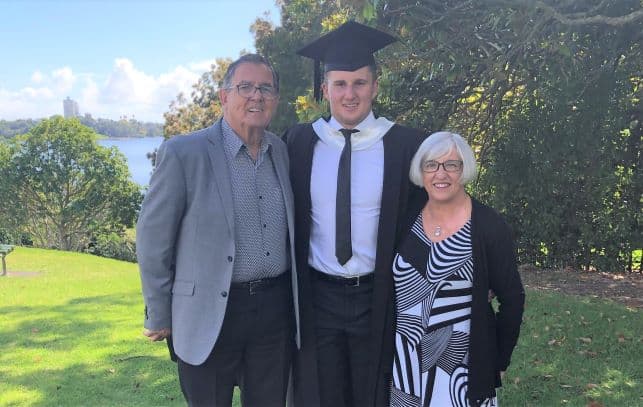Family the Key to Success
Bayley Garnham’s struggles all made sense when he was diagnosed with dyspraxia and dysgraphia at the age of 12. Bayley went on to complete a Bachelor of Sport and Exercise Science and is now a personal trainer and gym owner, passionate about helping others reach their potential. Bayley says he owes much of his success to the support of his parents and grandparents.

Patience is everything
By Sandy Young & Rick Garnham (Bayley’s parents)
We thought Bayley’s issues with co-ordination, fine motor skills and writing were all down to his poor eyesight, which was as the result of a forceps birth. Simple tasks like tying his shoelaces, dressing, catching a ball, climbing and handwriting were so challenging. He’d learn a skill one day but not be able to do it the next. He couldn’t ride a bike until he was eight and it took six attempts for him to get his driver’s licence.
Now, thinking back, even when he started day care at the age of two, his movements were unco-ordinated. One of the teachers made a wooden board with nails on it and attached rubber bands so Bayley could use it to strengthen his hands.
Bayley would get extremely frustrated and at times lash out. As a child he tried every sport, but nothing came naturally, and he couldn’t understand why it was easy for his friends. Climbing in the playground or over fences was hard too and often other kids would tease him.
In Year 6, we talked to his schoolteacher about our concerns with the standard of his writing and presentation. Her response was not to worry, he had fantastic creativity and in time everything else would correct itself. By Year 7, it was apparent that Bayley was struggling with his schoolwork too. Homework was taking twice as long as it should have.
In Year 8, Bayley’s art teacher noticed his unusual his hand movements while drawing and suggested we get an assessment. After his dyspraxia and dysgraphia diagnoses, we had a meeting with his school and all of Bayley’s teachers were notified. This sounds like an easy fix, but every year it was a constant battle for us at parent-teacher meetings. Some teachers were great and understood his challenges; others didn’t want to know about it. Organising a teacher aid and reader/writers made a big difference. “Don’t hesitate to tell others so they understand how to communicate and work with your child. Knowing and learning about Bayley’s dyspraxia helped us identify what we needed to do to support him. Dyspraxia was never an excuse for him, but we had to remind him it was a reason for why he was like he was and needed extra assistance in certain areas.
Our advice for parents is don’t hesitate to tell others so they understand how to communicate and work with your child. And patience is everything; be willing to repeat things. Staying calm is important too. I hate to say it but even now we still still proof Bayley’s written communication even though it has definitely improved.
We also recommend trying things with your child. It wasn’t until Bayley found weight-lifting that he started to shine. His coach was a great mentor who has moulded Bayley’s life.
We are still very protective of Bayley, even today, and so proud of what he has achieved to date. Since the age of 11 he has been so focused on what he wanted to do, and he is achieving and exceeding all his expectations. Bayley has never given up.

You can do it
By Karin & Kevin Futter (Bayley’s grandparents)
Bayley is our only grandson. We moved to Auckland in 2006 when he was 6 years old. Our daughter and son-in law-had busy jobs and had no back-up to look after Bayley during school holidays.
We soon realised Bayley had difficulty performing certain everyday tasks, but we just put it down to him being a slow learner. He struggled with reading too, so we spent a whole year with Bayley working through a manual, Toe by Toe, which was designed by two English schoolteachers for children with dyslexia. At the end of this course, his reading had improved dramatically. We then purchased him one book after another – all the classics: Huckleberry Finn, Robinson Crusoe, Black Beauty etc, probably 15 or 20 in all. There was a noticeable improvement in his reading.
We also spent extra time teaching him how to ride his bike, tie his shoelaces, tie his tie and set his combination lock for school. Countless hours were also spent throwing and catching a ball. We taught him little phrases to memorise, such as: ‘You can do it.’ We told him never to let anyone tell him he couldn’t achieve something. Another was: ‘Make the right choices.’ We explained that it’s important in life to make the right choices. More recently we said: “We all have two ears and one mouth, so we should listen twice as much as we talk.” We encouraged his mum and dad to send Bayley to a private school with smaller class sizes and he received extra attention.
When Bayley was diagnosed with dyspraxia, we completely understood the reason behind his learning difficulties. To see him pass his NCEA and go on to study at university, succeed in obtaining a degree and building up his own business has made us immensely proud. We are both thrilled to have such a close relationship with him.
The power of a positive role model
By Bayley Garnham
The one person outside of my family who I will forever be in debt to and look up to as a mentor is Mike Schofield. At 12, I started going to the gym. Mike was my personal trainer at the time and the person who got me into Olympic weightlifting as my first coach. Without him, I wouldn’t be where I am now and have the understanding of my dyspraxia as I do. As soon as we told him about my dyspraxia, he went away and started to research it and develop an understanding for what it’s like to train someone with dyspraxia.
As time went on, he knew me inside and out. He would know by seeing how I would walk into the gym if he could push me or if we needed to take it easy and focus on simple movements. I would tell him anything and everything and he was always there to listen, give advice or just have a good laugh with, which, looking back, was exactly what I needed. Now a personal trainer myself, I believe I have a platform that can allow me to do the same as he did for me.
You can learn more about me and the work that I do at www.autmillennium.org.nz/portfolio-item/bayley-garnham/
If you want to contact me to talk about you, your child or your family’s experiences with dyspraxia or dysgraphia, I would love to hear from you: bayleygarnham@gmail.com






